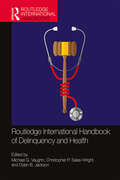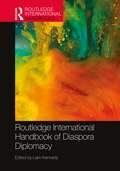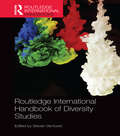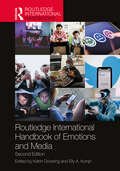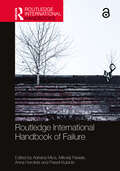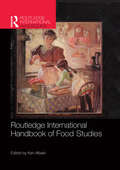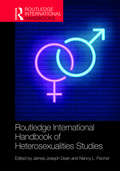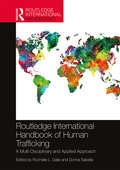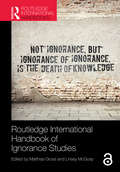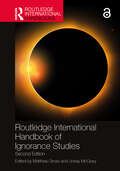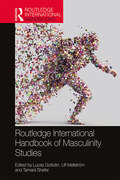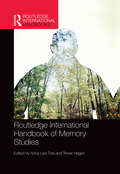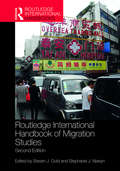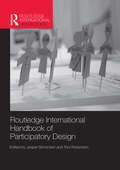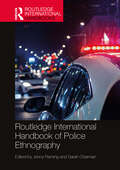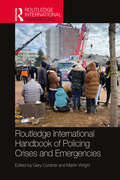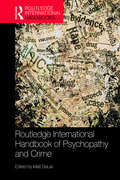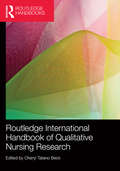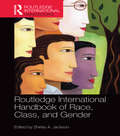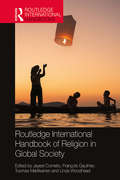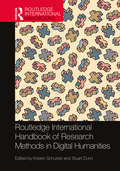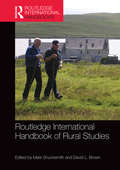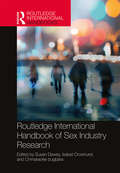- Table View
- List View
Routledge International Handbook of Delinquency and Health (Routledge International Handbooks)
by Michael G. Vaughn Christopher P. Salas-Wright Dylan B. JacksonThe Routledge International Handbook of Delinquency and Health presents state-of-the-art research and theorizing on the intersections between health, delinquency, and the juvenile justice system. Organized into three parts—Theoretical and Empirical Foundations; Behavioral, Mental, and Physical Health Conditions; and Prevention, Policy, and Health Promotion Systems—it is the largest and most comprehensive work of its kind, featuring contributions from scholars from multiple nations and global regions. A growing number of researchers, practitioners, and policymakers from criminology and criminal justice, social work, medicine, psychiatry and psychology, and other health science disciplines engage with marginalized adolescent populations who are at elevated risk for violence and delinquency, alcohol and other drug use, health and mental health problems, and other difficulties directly related to public safety and well-being. These risk factors often lead to short-term (e.g., detention, juvenile residential treatment facilities) and long-term (e.g., prison, parole) contact with the criminal justice system. As these fields increasingly overlap, the distinctions between them are blurred. Sound decision-making in the juvenile justice system depends on adequate research and policy at the intersection of delinquency and health. This volume represents an agenda-setting scholarly resource for the expansion of research and policy-making across the international delinquency and health continuum, and will be an essential resource for all who study or work in the field.
Routledge International Handbook of Diaspora Diplomacy (Routledge International Handbooks)
by Liam KennedyThe Routledge International Handbook of Diaspora Diplomacy is a multidisciplinary collection of writings by leading scholars and practitioners from around the world. It reflects on the geopolitical and technological shifts that have led to the global emergence of this form of diplomacy and provides detailed examples of how governments, intergovernmental organizations (IGOs), non-governmental organizations (NGOs) and corporations are engaging diasporas as transnational agents of intervention and change.The organization in six thematic parts provides for focused coverage of key issues, sectors and practices, while also building a comprehensive guide to the growing field. Each section features an introduction authored by the Editor, designed to provide useful contextual information and to highlight linkages between the chapters. Cross-disciplinary research and commentary is a key feature of the Handbook, providing diverse yet overlapping perspectives on diaspora diplomacy.• Part 1: Mapping Diaspora Diplomacy• Part 2: Diaspora Policies and Strategies• Part 3: Diaspora Networks and Economic Development• Part 4: Long-Distance Politics• Part 5: Digital Diasporas, Media and Soft Power• Part 6: Advancing Diaspora Diplomacy StudiesThe Routledge International Handbook of Diaspora Diplomacy is a key reference point for study and future scholarship in this nascent field.
Routledge International Handbook of Diaspora Diplomacy (Routledge International Handbooks)
by Liam KennedyThe Routledge International Handbook of Diaspora Diplomacy is a multidisciplinary collection of writings by leading scholars and practitioners from around the world. It reflects on the geopolitical and technological shifts that have led to the global emergence of this form of diplomacy and provides detailed examples of how governments, intergovernmental organizations (IGOs), non-governmental organizations (NGOs) and corporations are engaging diasporas as transnational agents of intervention and change.The organization in six thematic parts provides for focused coverage of key issues, sectors and practices, while also building a comprehensive guide to the growing field. Each section features an introduction authored by the Editor, designed to provide useful contextual information and to highlight linkages between the chapters. Cross-disciplinary research and commentary is a key feature of the Handbook, providing diverse yet overlapping perspectives on diaspora diplomacy.• Part 1: Mapping Diaspora Diplomacy• Part 2: Diaspora Policies and Strategies• Part 3: Diaspora Networks and Economic Development• Part 4: Long-Distance Politics• Part 5: Digital Diasporas, Media and Soft Power• Part 6: Advancing Diaspora Diplomacy StudiesThe Routledge International Handbook of Diaspora Diplomacy is a key reference point for study and future scholarship in this nascent field.
Routledge International Handbook of Diversity Studies (Routledge International Handbooks)
by Steven VertovecIn recent years the concept of ‘diversity’ has gained a leading place in academic thought, business practice and public policy worldwide. Although variously used, ‘diversity’ tends to refer to patterns of social difference in terms of certain key categories. Today the foremost categories shaping discourses and policies of diversity include race, ethnicity, religion, gender, disability, sexuality and age; further important notions include class, language, locality, lifestyle and legal status. The Routledge Handbook of Diversity Studies will examine a range of such concepts along with historical and contemporary cases concerning social and political dynamics surrounding them. With contributions by experts spanning Sociology, Anthropology, Political Science, History and Geography, the Handbook will be a key resource for students, social scientists and professionals. It will represent a landmark volume within a field that has become, and will continue to be, one of the most significant global topics of concern throughout the twenty-first century.
Routledge International Handbook of Emotions and Media (Routledge International Handbooks)
by Katrin Döveling Elly A. KonijnIn times of a worldwide pandemic, the election of a new US president, "MeToo," and "Fridays for Future," to name but a few examples, one thing becomes palpable: the emotional impact of media on individuals and society cannot be underestimated. The relations between media, people, and society are to a great extent based on human emotions. Emotions are essential in understanding how media messages are processed and how media affect individual and social behavior as well as public social life. Adopting a thoroughly interdisciplinary approach to the study of emotions in the context of media, the second, entirely revised and updated, edition of Routledge International Handbook of Emotions and Media comprises areas such as evolutionary psychology, media psychology, media sociology, cultural studies, media entertainment, and political and digital communication. Leading experts from across the globe explore cutting-edge research on the role of emotion in selecting and processing media contents, the emotional consequences of media use, politics and public emotion, emotions in political communication and persuasion, as well as emotions in digital, interactive, and virtual encounters. This compelling and authoritative Handbook is an essential reference tool for scholars and students of media, communication science, media psychology, emotion, cognitive and social psychology, cultural studies, media sociology, and related fields.
Routledge International Handbook of Failure (Routledge International Handbooks)
by Anna Horolets Adriana Mica Mikołaj PawlakThis Handbook examines the study of failure in social sciences, its manifestations in the contemporary world, and the modalities of dealing with it – both in theory and in practice. It draws together a comprehensive approach to failing, and invisible forms of cancelling out and denial of future perspectives. Underlining critical mechanisms for challenging and reimagining norms of success in contemporary society, it allows readers to understand how contemporary regimes of failure are being formed and institutionalized in relation to policy and economic models, such as neo-liberalism. While capturing the diversity of approaches in framing failure, it assesses the conflations and shifts which have occurred in the study of failure over time. Intended for scholars who research processes of inequality and invisibility, this Handbook aims to formulate a critical manifesto and activism agenda for contemporary society. Presenting an integrated view about failure, the Handbook will be an essential reading for students in sociology, social theory, anthropology, international relations and development research, organization theory, public policy, management studies, queer theory, disability studies, sports, and performance research.
Routledge International Handbook of Food Studies (Routledge International Handbooks)
by Ken AlbalaOver the past decade there has been a remarkable flowering of interest in food and nutrition, both within the popular media and in academia. Scholars are increasingly using foodways, food systems and eating habits as a new unit of analysis within their own disciplines, and students are rushing into classes and formal degree programs focused on food. Introduced by the editor and including original articles by over thirty leading food scholars from around the world, the Routledge International Handbook of Food Studies offers students, scholars and all those interested in food-related research a one-stop, easy-to-use reference guide. Each article includes a brief history of food research within a discipline or on a particular topic, a discussion of research methodologies and ideological or theoretical positions, resources for research, including archives, grants and fellowship opportunities, as well as suggestions for further study. Each entry also explains the logistics of succeeding as a student and professional in food studies. This clear, direct Handbook will appeal to those hoping to start a career in academic food studies as well as those hoping to shift their research to a food-related project. Strongly interdisciplinary, this work will be of interest to students and scholars throughout the social sciences and humanities.
Routledge International Handbook of Heterosexualities Studies (Routledge International Handbooks)
by James Joseph Dean Nancy L. FischerWhile a majority of people identify as "heterosexual" if asked about their sexual identity, what does that really mean? How did identifying as "straight" arise, particularly in relation to identifying as "queer," "lesbian," and "gay"? How are individuals socialized to view themselves and others as straight, even when many people are sexually fluid? How do institutions like government bodies, the educational system, and the family reinforce heterosexuality? This collection introduces the field of Critical Heterosexualities Studies and key lines of inquiry within the field. Like Masculinity Studies and Whiteness Studies, Heterosexualities Studies critically examines the dominant category and identity group in order to illuminate the taken-for-granted assumptions that surround heterosexual identities. This critical perspective questions the idea that heterosexuality is natural, normal, and biologically driven. A recurring question throughout this Handbook is: what does it mean to say that there are multiple forms of heterosexuality? The answer is provided by cases showing how straightness varies between men and women but also across different racial groups, social classes, and one’s status as trans or cisgender. Organized around key themes of inquiry including heterosexualities across the life course, straight identities and their intersections, the power of straightness in state politics, and the changing meaning of heterosexualities in the context of sexual fluidity, this collection provides readers with an introduction to Critical Heterosexualities Studies through important theoretical statements, key historical studies, and current empirical research. Featuring both classic works and original essays written expressly for this volume, this collection provides a state-of-the-art overview of this exciting new field in sexualities studies.
Routledge International Handbook of Human Trafficking: A Multi-Disciplinary and Applied Approach (Routledge International Handbooks)
by Rochelle L. Dalla Donna SabellaAccording to the UNODC (2015), human trafficking (HT) is the fastest growing means by which people are enslaved, the fastest growing international crime, and one of the largest sources of income for organized criminal networks. It profoundly impacts the physical and mental health of victims, their families, and entire communities and is recognized as a crime against humanity. Despite burgeoning interest, education, research, and advocacy efforts, a pinnacle handbook devoted to human trafficking and modern-day slavery – with global focus and multidisciplinary scope – does not currently exist. The Routledge International Handbook of Human Trafficking was created to fill this resource gap. Divided into four sections, the Handbook offers the reader a comprehensive and fresh approach via: (a) in-depth analyses and opportunities for application (through case studies, critical thinking questions, and supplemental learning materials); (b) multidisciplinary linkages, with disciplinary overlap across each of the four sections acknowledged and highlighted; and (c) content experts representing multiple segments of society (academia, government, foundation, law enforcement, and practice) and global vantage points (Australia, Finland, Germany, Netherlands, South Africa, Thailand, and the United States). Written by expert scholars, service providers, policy analysts, and healthcare professionals, this Handbook is an invaluable resource for those already working in the field, as well as for students in any discipline who want to learn (or learn more) about HT and modern-day slavery.
Routledge International Handbook of Ignorance Studies (Routledge International Handbooks)
by Matthias Gross Linsey McGoeyOnce treated as the absence of knowledge, ignorance today has become a highly influential topic in its own right, commanding growing attention across the natural and social sciences where a wide range of scholars have begun to explore the social life and political issues involved in the distribution and strategic use of not knowing. The field is growing fast and this handbook reflects this interdisciplinary field of study by drawing contributions from economics, sociology, history, philosophy, cultural studies, anthropology, feminist studies, and related fields in order to serve as a seminal guide to the political, legal and social uses of ignorance in social and political life.
Routledge International Handbook of Ignorance Studies (Routledge International Handbooks)
by Matthias GrossOnce treated as the absence of knowledge, ignorance has now become a highly influential and rapidly growing topic in its own right. This new edition of the seminal text in the field is fully revised and includes new and expanded chapters on religion; domestic law and jurisprudence; sexuality and gender studies; memory studies; international relations; psychology; decision-theory; and colonial history. The study of ignorance has attracted growing attention across the natural and social sciences where a wide range of scholars explore the social life and political issues involved in the distribution and strategic use of not knowing. This handbook reflects the interdisciplinary field of ignorance studies by drawing contributions from economics, sociology, history, philosophy, cultural studies, anthropology, feminist studies, and related fields to serve as a path-breaking guide to the political, legal and social uses of ignorance in social and political life. This book will be indispensable for anyone seeking to understand the important role played by ignorance in contemporary society, culture and politics.
Routledge International Handbook of Investigative Interviewing and Interrogation (Routledge International Handbooks)
by Dave Walsh, Ray Bull and Igor ArehThis handbook provides readers with coverage of the various interview and interrogation techniques used across the world with victims, witnesses, and suspected offenders. It includes exclusive coverage on countries rarely, if ever, previously reported upon in the literature to any substantive depth.Bringing together a collection of chapters from over 40 countries, this handbook advises and explains the practices used in crime interviewing and informs the reader of contemporary developments hitherto unreported in any current book on interviewing and interrogation. In doing so, the Routledge International Handbook of Investigative Interviewing and Interrogation showcases global exemplars of evidence-based practice informed by scientific research. Building on recent research, including protocols developed in a variety of countries, this book is particularly timely in the wake of the "Méndez Principles", a set of principles developed by the UN (i) to counter the ill-treatment of suspects during police questioning and (ii) to gather more reliable information.This handbook will be an essential reference text across criminology, criminal justice, policing and investigation studies, and law.
Routledge International Handbook of Masculinity Studies (Routledge International Handbooks)
by Ulf Mellström Tamara Shefer Lucas GottzénThe Routledge International Handbook of Masculinity Studies provides a contemporary critical and scholarly overview of theorizing and research on masculinities as well as emerging ideas and areas of study that are likely to shape research and understanding of gender and men in the future. The forty-eight chapters of the handbook take an interdisciplinary approach to a range of topics on men and masculinities related to identity, sex, sexuality, culture, aesthetics, technology and pressing social issues. The handbook’s transnational lens acknowledges both the localities and global character of masculinity. A clear message in the book is the need for intersectional theorizing in dialogue with feminist, queer and sexuality studies in making sense of men and masculinities. Written in a clear and direct style, the handbook will appeal to students, teachers and researchers in the social sciences and humanities, as well as professionals, practitioners and activists.
Routledge International Handbook of Memory Studies (Routledge International Handbooks)
by Anna Lisa Tota Trever HagenThe Routledge International Handbook of Memory Studies offers students and researchers original contributions that comprise the debates, intersections and future courses of the field. It is divided in six themed sections: 1)Theories and Perspectives, 2) Cultural artefacts, Symbols and Social practices, 3) Public, Transnational, and Transitional Memories 4) Technologies of Memory, 5) Terror, Violence and Disasters, 6) and Body and Ecosystems. A strong emphasis is placed on the interdisciplinary breadth of Memory Studies with contributions from leading international scholars in sociology, anthropology, philosophy, biology, film studies, media studies, archive studies, literature and history. The Handbook addresses the core concerns and foundations of the field while indicating new directions in Memory Studies.
Routledge International Handbook of Migration Studies: 2nd edition (Routledge International Handbooks)
by Steven J. Gold Stephanie J. NawynThis revised and expanded second edition of Routledge International Handbook of Migration Studies provides a comprehensive basis for understanding the complexity and patterns of international migration. Despite increased efforts to limit its size and consequences, migration has wide-ranging impacts upon social, environmental, economic, political and cultural life in countries of origin and settlement. Such transformations impact not only those who are migrating, but those who are left behind, as well as those who live in the areas where migrants settle. Featuring forty-six essays written by leading international and multidisciplinary scholars, this new edition showcases evolving research and theorizing around refugees and forced migrants, new migration paths through Central Asia and the Middle East, the condition of statelessness and South to South migration. New chapters also address immigrant labor and entrepreneurship, skilled migration, ethnic succession, contract labor and informal economies. Uniquely among texts in the subject area, the Handbook provides a six-chapter compendium of methodologies for studying international migration and its impacts. Written in a clear and direct style, this Handbook offers a contemporary integrated resource for students and scholars from the perspectives of social science, humanities, journalism and other disciplines.
Routledge International Handbook of Participatory Design (Routledge International Handbooks)
by Jesper Simonsen Toni RobertsonParticipatory design is about the direct involvement of people in the co-design of the technologies they use. Its central concern is how collaborative design processes can be driven by the participation of the people affected by the technology designed. Embracing a diverse collection of principles and practices aimed at making technologies, tools, environments, businesses, and social institutions more responsive to human needs, the International Handbook of Participatory Design is a state-of-the-art reference handbook for the subject. The Handbook brings together a multidisciplinary and international group of highly recognized and experienced experts to present an authoritative overview of the field and its history and discuss contributions and challenges of the pivotal issues in participatory design, including heritage, ethics, ethnography, methods, tools and techniques and community involvement. The book also highlights three large-scale case studies which show how participatory design has been used to bring about outstanding changes in different organizations. The book shows why participatory design is an important, highly relevant and rewarding area for research and practice. It will be an invaluable resource for students, researchers, scholars and professionals in participatory design.
Routledge International Handbook of Police Ethnography (Routledge International Handbooks)
by Jenny Fleming Sarah CharmanEthnography has a long history in the humanities and social sciences and has provided the base line in the field of police studies for over 60 years. We have recently witnessed a resurgence in ethnographic practice among police scholars, and this Handbook is a response to that revival. Students and academics are returning to the ethnography arena and the study of police in situ to explain the evocative worlds of the police. The list of ethnographic sites is vast and all have fed the rejuvenation of ethnographic endeavour. Together they suggest innovation, theoretical depth, broad geographical boundaries, multi-site experiments, and multi-disciplinarity, all of which are central to the exploration of police and policing in the twenty-first century. This Handbook encapsulates the revival of police ethnography by exploring its multidisciplinary field and cataloguing the ongoing ethnographic work. It offers an original and international contribution to the field of police studies and research methods, providing a comprehensive and overarching guide to police ethnography. We see the previous classics in every page and still note the influence of the early ethnographers. At the same time, we see the innovative breadth and diversity of these narratives. The aim of this Handbook is to highlight the mosaic that is police ethnography at a point in time and note with pleasure its contribution to the field once more. Ethnography may be messy, difficult, and at times uncooperative, but its results offer a unique insight into the perspectives of people and organisations that can hide in plain sight. An accessible and compelling read, this Handbook will provide a sound and essential reference source for academics, researchers, students, and practitioners engaged in police and criminal justice studies.
Routledge International Handbook of Policing Crises and Emergencies (Routledge International Handbooks)
by Gary Cordner Martin WrightThis handbook explores those occasions when the police are faced with a public, national, or international crisis and are expected to continue to serve. It provides a unique, scholarly, and international overview on policing crises and emergencies, addressing the different contexts and challenges of working in extraordinary circumstances, dealing with unfamiliarity, and working with and alongside other agencies, as well as the significant political and public requirement to return as quickly as possible to normality. Sections include coverage of:• Policing disasters• Policing public health emergencies• Policing political protest• Policing terror and conflict• Policing mass violence• Policing extreme crises and emergenciesEach section is filled with a variety of international case studies examining best practice in the policing context, together with a scene-setting chapter tying together key theoretical and conceptual concepts. It is essential reading for all engaged with professional policing, law enforcement, and public order.
Routledge International Handbook of Psychopathy and Crime (Routledge International Handbooks)
by Matt DeLisiFor over two centuries, psychopathy has stood as perhaps the most formidable risk factor for antisocial behavior, crime, and violence. The Routledge International Handbook of Psychopathy and Crime presents the state-of-the-art on the full landscape of research on antisocial behavior that employs psychopathy as a central correlate. It is the largest and most comprehensive work of its kind, and includes contributions from renowned scholars from around the world. Organized into five distinctive sections, this book covers the etiology of psychopathy; the measurement of psychopathy; the association between psychopathy and diverse forms of homicidal and sexual offending, including serial murder, sexual homicide, rape and child molestation; criminal careers and psychopathy; the role of psychopathy in criminal justice system supervision, including institutional misconduct, noncompliance, and recidivism. This book is an essential resource for students and researchers in criminology, psychology, and criminal justice and will be of interested to all those interested in criminal behavior, sexual and violent crime, forensic psychology and forensic mental health.
Routledge International Handbook of Qualitative Nursing Research
by Cheryl Tatano BeckQualitative research, once on the fringes, now plays a central part in advancing nursing and midwifery knowledge, contributing to the development of the evidence base for healthcare practice. Divided into four parts, this authoritative handbook contains over forty chapters on the state of the art and science of qualitative research in nursing. The first part begins by addressing the significance of qualitative inquiry to the development of nursing knowledge, and then goes on to explore in depth programs of qualitative nursing research. The second section focuses on a wide range of core qualitative methods, from descriptive phenomenology, through to formal grounded theory and to ethnography, and narrative research. The third section highlights key issues and controversies in contemporary qualitative nursing research, including discussion of ethical and political issues, evidence-based practice and Internet research. The final section takes a unique look at qualitative nursing research as it is practiced throughout the world with chapters on countries and regions from the UK and Europe, North America, Australasia, Latin America, to Japan, China, and Korea. With an international selection of established scholars contributing, this is an essential overview and will help to propel qualitative research in nursing well into the twenty-first century. It is an invaluable reference for all nursing researchers.
Routledge International Handbook of Race, Class, and Gender (Routledge International Handbooks)
by Shirley A. JacksonThe Routledge International Handbook of Race, Class, and Gender chronicles the development, growth, history, impact, and future direction of race, gender, and class studies from a multidisciplinary perspective. The research in this subfield has been wide-ranging, including works in sociology, gender studies, anthropology, political science, social policy, history, and public health. As a result, the interdisciplinary nature of race, gender, and class and its ability to reach a large audience has been part of its appeal. The Handbook provides clear and informative essays by experts from a variety of disciplines, addressing the diverse and broad-based impact of race, gender, and class studies. The Handbook is aimed at undergraduate and graduate students who are looking for a basic history, overview of key themes, and future directions for the study of the intersection of race, class, and gender. Scholars new to the area will also find the Handbook’s approach useful. The areas covered and the accompanying references will provide readers with extensive opportunities to engage in future research in the area.
Routledge International Handbook of Religion in Global Society (Routledge International Handbooks)
by Jayeel CornelioLike any other subject, the study of religion is a child of its time. Shaped and forged over the course of the twentieth century, it has reflected the interests and political situation of the world at the time. As the twenty-first century unfolds, it is undergoing a major transition along with religion itself. This volume showcases new work and new approaches to religion which work across boundaries of religious tradition, academic discipline and region. The influence of globalizing processes has been evident in social and cultural networking by way of new media like the internet, in the extensive power of global capitalism and in the increasing influence of international bodies and legal instruments. Religion has been changing and adapting too. This handbook offers fresh insights on the dynamic reality of religion in global societies today by underscoring transformations in eight key areas: Market and Branding; Contemporary Ethics and Virtues; Intimate Identities; Transnational Movements; Diasporic Communities; Responses to Diversity; National Tensions; and Reflections on ‘Religion’. These themes demonstrate the handbook’s new topics and approaches that move beyond existing agendas. Bringing together scholars of all ages and stages of career from around the world, the handbook showcases the dynamism of religion in global societies. It is an accessible introduction to new ways of approaching the study of religion practically, theoretically and geographically.
Routledge International Handbook of Research Methods in Digital Humanities
by Stuart Dunn Kristen SchusterThis book draws on both traditional and emerging fields of study to consider consider what a grounded definition of quantitative and qualitative research in the Digital Humanities (DH) might mean; which areas DH can fruitfully draw on in order to foster and develop that understanding; where we can see those methods applied; and what the future directions of research methods in Digital Humanities might look like. Schuster and Dunn map a wide-ranging DH research methodology by drawing on both ‘traditional’ fields of DH study such as text, historical sources, museums and manuscripts, and innovative areas in research production, such as knowledge and technology, digital culture and society and history of network technologies. Featuring global contributions from scholars in the United Kingdom, the United States, Europe and Australia, this book draws together a range of disciplinary perspectives to explore the exciting developments offered by this fast-evolving field. Routledge International Handbook of Research Methods in Digital Humanities is essential reading for anyone who teaches, researches or studies Digital Humanities or related subjects.
Routledge International Handbook of Rural Studies (Routledge International Handbooks)
by Mark Shucksmith and David L. BrownRural societies around the world are changing in fundamental ways, both at their own initiative and in response to external forces. The Routledge International Handbook of Rural Studies examines the organisation and transformation of rural society in more developed regions of the world, taking an interdisciplinary and problem-focused approach. Written by leading social scientists from many countries, it addresses emerging issues and challenges in innovative and provocative ways to inform future policy. This volume is organised around eight emerging social, economic and environmental challenges: Demographic change. Economic transformations. Food systems and land. Environment and resources. Changing configurations of gender and rural society. Social and economic equality. Social dynamics and institutional capacity. Power and governance. Cross-cutting these challenges are the growing interdependence of rural and urban; the rise in inequality within and between places; the impact of fiscal crisis on rural societies; neoliberalism, power and agency; and rural areas as potential sites of resistance. The Routledge International Handbook of Rural Studies is required reading for anyone concerned with the future of rural areas.
Routledge International Handbook of Sex Industry Research (Routledge International Handbooks)
by Susan Dewey Isabel Crowhurst Chimaraoke IzugbaraThe Routledge International Handbook of Sex Industry Research unites 45 contributions from researchers, sex workers, activists, and practitioners who live and work in 28 countries throughout the world. Focusing tightly on the contemporary state of sex industry research through eight carefully selected themes, this volume sets a clear agenda for future research, activism, and policymaking. Approaching the topic from a multidisciplinary perspective on an expanding field frequently divided by political and ideological conflicts, the handbook clearly establishes the parameters of the field while also showcasing the most vibrant contemporary empirical and theoretical work. Unprecedented in its global scope, the Routledge International Handbook of Sex Industry Research will appeal to students, researchers, and policy makers interested in fields such as sociology of gender and sexuality; crime, justice, and the sex industry; sociology of work and professions; and sexual politics.
